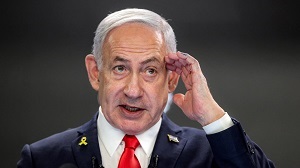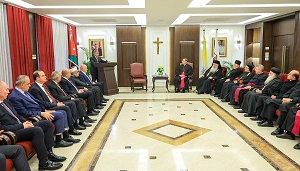Why this Lying to Palestinians and in the Name of Palestine Today? - By Hazem Saghieh, Asharq Al-Awsat
A few days ago, Mohammad Fahmi, the Lebanese interior minister appeared on one of the local television stations. The minister was advocating for “total lockdown” as a means for confronting the coronavirus pandemic, a reasonable thing for an interior minister to say. However, what Fahmi said, in contrast, was that abstaining from implementing it would pull society apart from the inside, and “this is an obvious Zionist objective".
The phrase prompted much ridicule, especially by those who recalled that Palestinians, the assumed victims of the Zionist enemy, had recently been barred from returning to Lebanon. However, the issue is nonetheless deeper than its preposterousness. It is an affront to the Palestinians' pain and cause, a belittlement that stems from nothing but trivialization.
With that, the extent of this assessment’s popularity indicates the Palestinian cause’s susceptibility to belittlement and trivialization. It has unfortunately been turned into an easy talking point shared by the commons.
Muhammad Fahmi acted with the naivety of a man following fashion. The man Pavlovianly uttered a phrase that has become automatic. But there are others who combine living on another planet with cheating this one when they speak this language.
The Hezbollah Secretary-General Hassan Nassrallah, said in his speech on “Quds Day”, "We are closer than ever to Jerusalem and liberating it today despite all of the regional and international transformations and internal strife.”
The Lebanese “Axis of Resistance” newspaper Al Akhbar beat Nassrallah to it by a few days, saying, on the 72nd anniversary of the 1948 Nakba that Palestine is “irremovable”. One of its writers, filled with optimism, considered that "the balance of power is not in favor of the Zionist Entity, which was not the case during the Nakba phase or the phases that came after it." From afar, as usual, Iran's Supreme Leader Ali Khamenei made his remarks. The “treatment,” as suggested by the Ayatollah, is the “final solution” for Israel (though he exempted “the Jewish people” from his solution).
As we all know, the "final solution", is the term used that the Nazis used to describe the genocide of the Jews in Europe.
This rhetoric is not new of course, for it has been reiterated by Arab politicians and intellectuals since 1936 at the latest, though its frequency would rise and fall. Today, this frequency is rising and its radiance and presence among us are increasing. Its frequent use is closely linked to the amplified importance and need for rhetorical catharsis.
For example, whenever Israeli planes or drones fly over Damascus and the number of sites they target increases the rhetoric of threats and vengeance flies as well. When the Jewish state forms a government that is open about its aggressive program (annexing the settlements of the West Bank), as is the case today, our proximity to Jerusalem and the imminence of our praying there are stressed more emphatically.
Nevertheless, the rising frequency of this rhetoric is linked to another reason: it flourished in the immediate aftermath of the 67 defeat as a “response”, after which it returned to its dormancy for a while. After Egypt's exit from the Arab-Israeli conflict as a result of the Camp David accords in 1978-9, it was reinvigorated once more and epic promises of liberation and prayer in Jerusalem gained steam. Its resurrection in the late 1970s was a circuitous expression of a fear that conditions of engagement would worsen due to the Egyptian-Israeli event. Now, the Syrian and Iraqi exits from this conflict are being laid bare: the first because it has been destroyed, ripped apart and occupied by multiple powers, and the second because it is fragmented, poor, and divided among those who yield influence from the outside. This conjuncture finds its culmination in relying on Iran for liberation!
This limited practical tenability calls for that absolute verbal irrationality.
In contrast, the Palestinian writer Mohmmed Shehada, who knows what he is talking about, writes in his ''Haaretz'' column that "The serious dangers of Israel’s lurking annexation cannot be overemphasized. Once officially implemented, it would be nearly impossible for any future Israeli government to walk it back or undo the ensuing damage.''
But he also notes that: ''From Abbas to Hamas, Palestinian leaders have no strategy against annexation. A fumbling, factional, incoherent Palestinian response to Israel’s looming move on the West Bank would be a dream for annexationists, and that’s exactly what’s happening.''
Majed Kayali, another Palestinian writer, concluded his recently published book “The Negotiations of Arms” with the following: ''Even if the Palestinians were better off in various aspects, their ability to invest their struggle and sacrifice requires Arab support and a suitable international situation. Thus, in the meantime, there ought to be a balancing between sacrifices and achievements, costs, and pay-offs, in the obstinate, complicated, long and bitter conflict. Therein lays the challenge facing the contemporary national Palestinian experience.''
This is the kind of rhetoric expressed by those who live on this planet and do not want to lie to themselves or the Palestinians, to turn lying into the only strategy for the future.
Latest News
-
 ‘Israel’ recognizes Somaliland as sovereign state
‘Israel’ recognizes Somaliland as sovereign state
-
 ‘Israel’ launches major military operation in Jenin
‘Israel’ launches major military operation in Jenin
-
 Deputising for King, interior minister attends midnight Christmas mass in Bethlehem
Deputising for King, interior minister attends midnight Christmas mass in Bethlehem
-
 King, Crown Prince extend their Christmas greetings, New Year wishes
King, Crown Prince extend their Christmas greetings, New Year wishes
-
 Prime minister extends Christmas, New Year greetings to Christian community
Prime minister extends Christmas, New Year greetings to Christian community